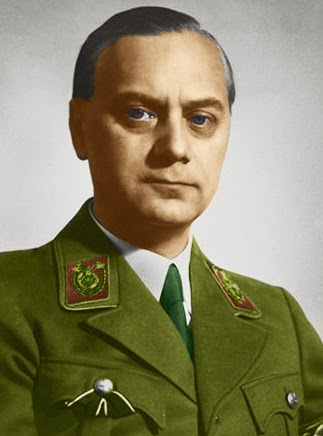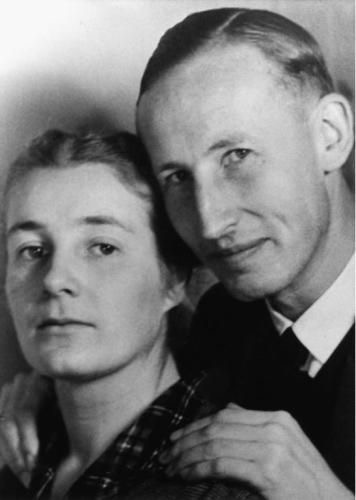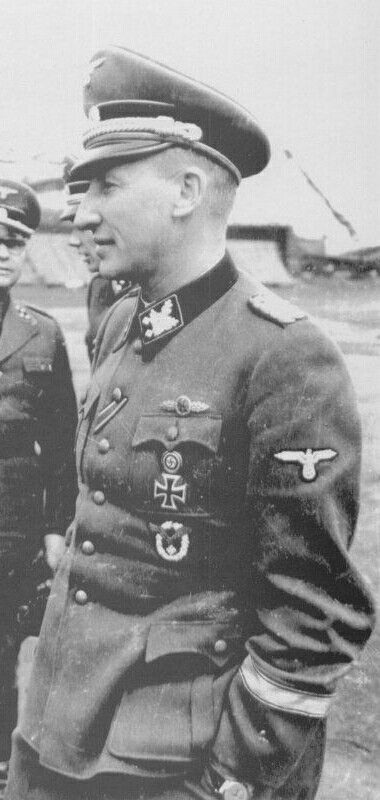 September 19th, 1919. Adolf Hitler meets Alfred Rosenberg. Actually, when exactly Adolf Hitler met Alfred Rosenberg for the first time (they were introduced to each other by Hitler’s mentor Dietrich Eckart). However, given the critical importance of this meeting for the whole “Adolf Hitler project”, it can be safely assumed that it happened right after Hitler joined DAP on September 19th, 1919.
September 19th, 1919. Adolf Hitler meets Alfred Rosenberg. Actually, when exactly Adolf Hitler met Alfred Rosenberg for the first time (they were introduced to each other by Hitler’s mentor Dietrich Eckart). However, given the critical importance of this meeting for the whole “Adolf Hitler project”, it can be safely assumed that it happened right after Hitler joined DAP on September 19th, 1919.
The “Rosenberg mission” was so vitally important that it was essentially a separate “special op” carefully planned and brilliantly executed by the Thule Society. Its importance stemmed from the fact that although the “Shock of Versailles” was powerful enough to facilitate the Transfiguration of Adolf Hitler, it had nothing to do with the Divine Mission of the Thule Society – fighting and winning the existential war with the Bolshevism and the Soviet Russia.
The Treaty of Versailles made Adolf Hitler firmly commit to the acquisition of the Lebensraum in the East (among other objectives)… but not to the annihilation of Bolshevism (which was the fundamental objective of the Thule Society).
True, Adolf Hitler already knew about the dangers and horrors of Bolshevism – events in Berlin, Munich and Budapest proved it beyond the reasonable doubt. But it still was not enough – after all, during the whole BSR mess Hitler chose to remain neutral (and urged his fellow soldiers to do the same).
To remedy this totally unacceptable situation, the Thule Society had to thoroughly indoctrinate (brainwash, if you will) Adolf Hitler in the existential dangers of Bolshevism.
And the best way to do it was, obviously, by supplying Hitler with a comprehensive, well-structured and emotionally powerful anti-Bolshevist ideology supported by a “critical mass” of first-hand witnesses of horrors, crimes and dangers of Bolshevism.
The execution of this all-important project was entrusted to one Alfred Rosenberg – quite a colorful character, to put it mildly. For starters, he was not even a German – if you apply the stringent definition used by the Nazis.
He was born in Reval (now Tallinn – the capital of an independent Estonia) to a father who was half Estonian and half Latvian (not a drop of the German blood in his veins) and a mother who had German and French ancestry.
Consequently, Rosenberg had less than ¼ of German blood in him… which did not prevent him from becoming one of the leaders of NSADP and the Nazi Germany. One of his positions was the Commissar for the Supervision of Intellectual and Ideological Education of the NSDAP (!).
In this position, Rosenberg became the principal author of key National Socialist ideological creeds (Hitler only used – but did not develop – them). Which proves quite convincingly that Nazis ignored their own “racial ideology” when it was deemed necessary.
But it was his “Russian experience” and his “Russian connections” that made him such a valuable tool for the Thule Society. During the Bolshevist Revolution of 1917, he lived in Moscow and saw with his own eyes what Bolsheviks intended to do and what they were capable of. His experiences during Estonian war for Independence only reinforced his (quite correct) perceptions of Bolshevism.
After he immigrated to Germany in January of 1919, he immediately joined the newly-minted (and still quite mysterious) Aufbau Vereinigung (Reconstruction Organization).
This Munich-based secret society was, indeed, committed to Reconstruction… of both Germany and Russia. In other words, its members intended to reverse (“undo”) both the Bolshevist Revolution of 1917 in Russia and the November Revolution of 1918 in Germany. By all means necessary – including political murder (these guys were really vicious).
Which in practice meant establishing far-right totalitarian nationalist regimes both in Berlin and in Moscow. Hence, it predictably united two on the surface very different (to put it mildly) political groups – Russian and German nationalists.
In reality, these groups were not that different because (thanks to the policies of Peter the Great and his successors) thousands and thousands of very much Russian nobles had German roots. Especially those who (like Rosenberg) had been born in the Baltic provinces of Russian Empire (Latvia, Lithuania and Estonia).
The leader of Aufbau Vereinigung was Riga-born Ludwig Maximilian Erwin von Scheubner-Richter. Rosenberg quickly became the chief ideologue of the organization… and the member of Thule Society (whether official or unofficial there is still some dispute).
Acting on orders from Thule leaders, Rosenberg joined the newly-minted DAP in January of 1919 thus becoming one of its first members and essentially the founders. And for eight months was patiently waiting for the arrival of The Chosen One. The Messiah – Adolf Hitler.
Immediately after he was introduced to Adolf Hitler, Rosenberg began to work on his mission – planting into Hitler’s mind, heart and soul the (entirely correct) conviction that Bolshevism was, indeed, the existential threat to Germany, Europe and the whole Western civilization.
And thus a firm commitment to eradicate the “Red Plague” from the face of the Earth – for good. Which fit nicely with the commitment that Adolf Hitler had already made – to acquiring sufficient Lebensraum in the East to make sure that the horrors of Blockade of Germany and the Great Hunger of 1917-19 never happen again.
Unfortunately, Alfred Rosenberg and other members of Aufbau Vereinigung were diehard anti-Semites (and murderously vicious ones at that). Which was understandable given the number of ethnic Jews among Bolshevist leaders – and mass murderers.
From these indisputable facts Rosenberg, von Scheubner-Richter and other members of Aufbau Vereinigung made entirely wrong conclusion – that Bolshevism was the key part of the (mythical) “global Jewish conspiracy” for world domination.
The conspiracy which had but one ultimate objective – destroy the human civilization as we know it and replace it with the global unitary Judeo-Bolshevist totalitarian state.
By that time Adolf Hitler was already a diehard anti-Semite himself – and a vicious one at that (see the “Gemlich letter”, for example). However, the all-important “eyewitnesses statements” made his anti-Semitism genuinely murderous. Which predictably led to the Holocaust – possibly the worst genocide in human history.
Apparently, Thule Society did not care a rat’s ass (pardon my French) about that. All they cared about was Hitler’s firm commitment to fighting and winning the existential war with Bolshevism – and thus saving the Western civilization from being destroyed by the “Red Plague”.
And this objective was accomplished – Hitler did make this commitment and 22 years later started the “hot war” with Bolshevist Soviet Union led by the “Red Tamerlane” Joseph Stalin. 24 hours or so before Stalin intended to attack Germany with a strike of his own…
Von Scheubner-Richter (there is no evidence that he was a member of the Thule Society) met Hitler in October 1920, and soon became his foreign policy adviser and a highly productive fundraiser for the Nazi party. However, he formally joined the NSDAP only in 1921 (reasons for this delay are still unknown).
Still, he was probably the most efficient “cash generator” for the Nazis, obtaining some serious money from conservative and right-wing members of German elite, industrialists, aristocrats, such as the Prussian Junkers and the Wittelsbachs, Catholic and Protestant Church leaders and wealthy Russian émigrés (all over Europe).
The latter hoped (through support from the NSDAP) to influence German policy with the ultimate objective of eliminating the Soviet Union and re-establishing the Russian Empire. Which made no sense, of course, given the firm commitment of the Nazis to their “Lebensraum-in-the-East” project (the last thing the Nazis wanted was the reconstruction of a powerful Russian Imperial state).
One very interesting fact is the connection between von Scheubner-Richter and the famous World War I general Erich Ludendorff. This connection provides another piece of (circumstantial) evidence that Ludendorff, indeed, asked Captain Karl Mayr to “insert” Adolf Hitler into DAP.
Which means that the whole thing could (could!) have happened in the following way. The Thule Society asked its member Alfred Rosenberg to talk to von Scheubner-Richter. Rosenberg asked von Scheubner-Richter to talk to Ludendorff. And Ludendorff asked Mayr to “implant” Hitler into DAP.
Von Scheubner-Richter was a brave officer (he fought in the Great War and in the Russian Civil War). So it is no surprise that he joined Adolf Hitler in the ridiculous Beer Hall Putsch.
Walking arm-in-arm with Hitler, he was shot in the lungs by the Bavarian police and died instantly. He was the only “first-tier” Nazi leader to die during the Beer Hall Putsch, and of all the early party members who died in the Putsch, Hitler claimed Scheubner-Richter to be the only “irreplaceable loss”.

 A perfect example of a typical Gestapo officer was its last chief Heinrich Müller whom Nazi lawyer and former police chief, SS-Obergruppenführer Werner Best called one of the “finest examples” of the Gestapo officers.
A perfect example of a typical Gestapo officer was its last chief Heinrich Müller whom Nazi lawyer and former police chief, SS-Obergruppenführer Werner Best called one of the “finest examples” of the Gestapo officers.

